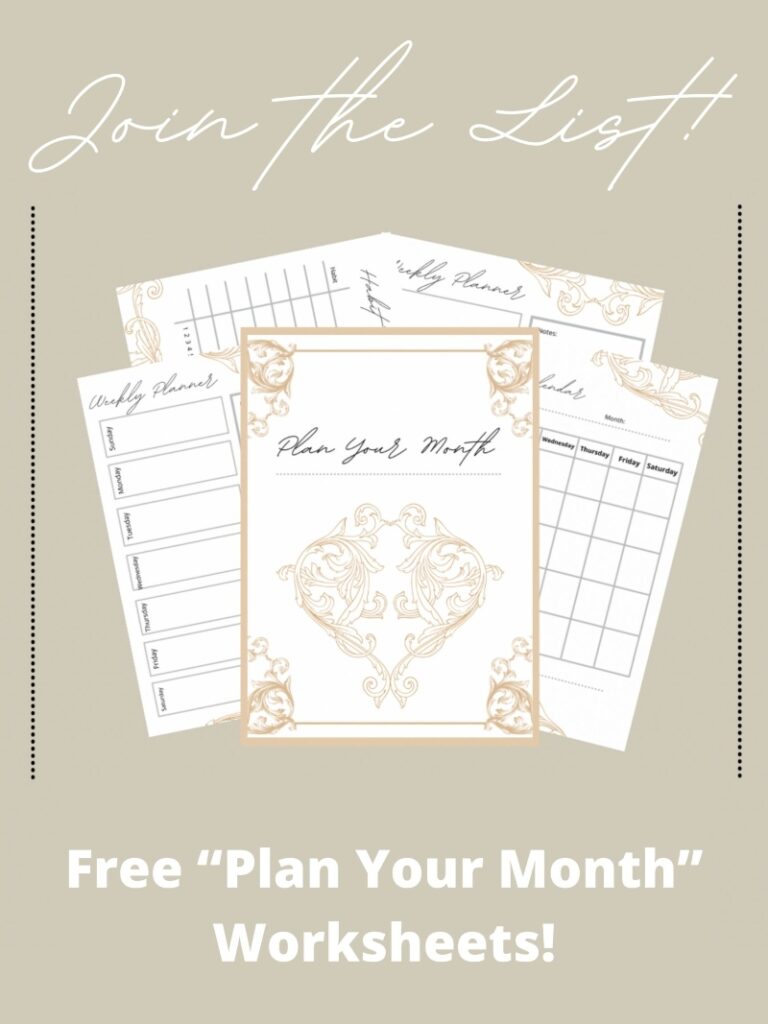Being successful is not (typically) an overnight thing. For many, hard work, time, and passion are the foundations for people who have achieved success in their careers or personal lives. While this isn’t to say that success can’t come easy to some, there is an overwhelming majority of people who find success through dedication and persistence.
Today, I wanted to share with you ten habits of highly successful women. There are several influencers and speakers that I look up to who have achieved what I would consider being success and accomplishment. I looked into the habits these women shared and compiled them here so that you might get an idea of what it is that people are doing to reach their dreams.
Disclaimer: All of the views and opinions in this post are solely my own and are not sponsored. This post may include affiliate links, meaning I earn a commission through links at no cost to you.

Define what success means to you
Before we dive right in, I think it’s important to define what success means to you. Success looks different for everybody, which can influence the way you go about working towards your goals. While the following habits included in this post tend to be generic and capable of suiting nearly every goal you set for yourself, it’s important to understand that these habits alone aren’t the whole picture.
Sure, many influencers and leaders in their niche follow many of these habits. However, there is a REASON that these habits bring about success.
Though, it’s crucial to note that habits alone are not enough. For many, marketing, networking, money, and dedication have placed successful women where they are today. So I highly encourage you to define what success is and then create a solid, tangible plan towards your goal.
Habits of successful women
As I’ve mentioned above, these habits are generic and are suited to helping you create a healthy and intentional lifestyle that allows you to achieve your goals. Enjoy!
1. They don’t shy away from constructive criticism
One of the first habits of nearly all successful women is that they don’t shy away from constructive criticism.
Criticism isn’t always fun, and it isn’t always helpful. But, if you can, you must face criticism head-on and seek to use it to your advantage. Constructive criticism, in particular, can help you to grow and develop as a person. When a leader or superior critiques your work, you should welcome it with an open mind and seek to understand where this person is coming from.
Not all criticism is constructive, however. I’ve had my work critiqued several times with little to no backing, reason, or follow-up associated with it. Often, critiques come from one of two places. 1) a leader or superior offers critique to help you better your work, or 2) someone critiques you out of jealousy or disagreement.
This is an important distinction to make as the former tends to be more constructive and therefore valuable to you while the latter may require you to turn the other cheek.
How to decide if criticism is constructive
I like to answer a few questions before deciding whether the criticism is helpful.
First, I ask whether the critique is coming from an expert. Is this a person with more experience than me? Is this a person with vast knowledge in my niche? Is this person a leader, boss, or superior? If an expert is criticizing my work, there may be a good reason behind it.
Next, I ask whether the criticism is coming from a place of aid. Is this person criticizing my work because they think I’m capable of better? Does this person genuinely want to help me improve? Is this critique helpful to my career/goals? If it’s evident that this person truly wants what’s best for me, the job, or my goals, I’m more likely to accept their opinion.
Finally, I ask whether the criticism offers a solution. Does this person tell how my work could be improved? Do they provide tangible reasons why my actions failed? Do they provide examples of what could be better? Does this person lay out measurable expectations? This is the part where criticism really diverges from constructive versus unconstructive.
An example:
Let’s say I got an email from my boss about an article I wrote poorly.
A bad critique may be: “This article doesn’t work for our needs. Please fix it.”
A good critique may be: “This article doesn’t work for our needs. There are keywords missing, and the arrangement of the headers is a bit confusing. Please fix it.”
This is a simplified version of a scenario that could happen. But what you’ll notice is that the second critique offers a solution and elaborates on why there’s a problem. This is the basis of constructive criticism.
When you receive constructive criticism, try not to let it get to you. Often, the criticism is meant to help and will allow you to better your skills for the future.
2. They don’t allow others to dictate their actions
Another habit that sets the successful apart from the unsuccessful is that the former doesn’t allow others to dictate their actions. By this, I mean that these women follow their own path and do what they believe is right for them.
It’s important to follow through with the goals set for yourself, even if others are in opposition to your desires. That’s not to say that they are wrong in telling you that they disapprove (if that is the case). Instead, they are wrong to tell you how you should act, react, or proceed with any given situation.
For example, let’s say you want to publish a memoir. You’ve been working diligently and have completed the manuscript, and have begun searching for a literary agent. Your friend argues that you’ll be better off self-publishing. They urge you to follow through with independent publication rather than continue on the traditional route. You argue that your path is what you genuinely want, and after weighing the costs and benefits, you deem it the best course of action. Rather than respecting your judgment, your friend continues to push their own opinion on you.
The key difference between offering advice and pushing one’s opinion lies in the person’s ability to respect your final choice. Women who have “made it” in their careers or personal lives have stuck by their own decisions and actions and have refused to let others pave their life for them.
Obviously, this becomes more convoluted when you live beneath your parents’ roof, as parents often dictate much of their children’s choices. But with time, you can learn to make decisions for yourself and take advice if need be or reflect other’s proposals if it doesn’t benefit you.

3. They have emotional agility
I’ve mentioned it before, and I will say it a thousand times over, but emotional agility is often the savior of miscommunication. I read a book called Emotional Agility by Dr. Susan David who elaborated on the importance of turning negative emotions and thought patterns into a course of action and sound clarity.
The book encourages readers to identify whether they are a brooder (a person who wallows in pity or anger when a bad situation is presented) or a bottler (a person who shoves aside negativity and bad memories to push forward) to begin working towards an emotional agile lifestyle. If you have emotional agility, you won’t bottle or brood when something terrible happens. Instead, you’ll pause, reflect, and reframe your course of action to resolve the situation or move forward despite it.
The author doesn’t ask readers to ignore negativity. And I fully support that sentiment. Why? Because negativity and bad situations shape you as a human. They teach you valuable lessons and help you learn how to navigate a complex world.
Women who gain success often learn emotional agility whether they read Dr. David’s book or not. They learn how to control their emotions rather than let their feelings control them. They gather a better understanding of how they respond in conflict or failure and learn to continue working towards their goals even when things get tough.
I encourage you to read Dr. David’s book if you haven’t already. It’s been one of the best resources for me in my relationships, both personally and professionally.
4. They focus on implementing healthy habits for themselves
Given that you’re reading this article, I would argue that you’re already well on your way to accomplishing this habit.
Successful women focus on inviting healthy habits into their lives because it is the quickest way to create change and become the person they want to be. There are several healthy habits you could include in your day-to-day routine, so the list of opportunities is quite extensive.
Aside from things mentioned in this article, here are a few ideas of habits you could create for yourself:
- Follow a healthy diet that is based on protein, carbs, and greens
- Keep to a healthy exercise schedule
- Dress for success every day (you’d be impressed how much your appearance plays into your psychological productivity!)
- Go to sleep and wake up at regular times (consistency is key!)
- Volunteer often and give back to others
- Avoid technology in the first and last hour of each day
Honestly, the list could go on, but these are some of the most common ones I’ve found.
5. They read and learn often
I’ve mentioned this before, but in my opinion, reading and the continuation of your education (not necessarily school-related) are the two most important habits you can implement for yourself.
As a college dropout, I don’t think traditional education is as effective as simply engaging in learning. Instead, I believe a person can continue learning by investing themselves in books, podcasts, free online courses, and other resources to further their knowledge on any given subject.
This is where reading becomes necessary. Reading books (and online articles, I’d argue) is the best way to go about furthering your understanding of a topic. Do you want to know more about digital marketing? Grab a book. Interested in culinary arts? There’s a book for that! Do you want to know more about cosmology and astrophysics? There are certainly books for that too.
While many successful people will say that nonfiction books have helped them most and are where they focus their energy for educational purposes, I would also like to add that fiction and classic literature can be beneficial. Reading, in general, is a great hobby to have no matter who you are, and it’s one of the ways you can allow yourself the opportunity to stand out amidst the crowd. Knowledge is power.
6. They work hard to reach their goals
It isn’t just enough to have goals and write them down, you need an action plan, and you need the self-discipline required to follow it through.
On my blog, this is the main thing I push. Work hard to reach your goals. Hone in on definitive systems that allow you to achieve the life you want and work for it. While yes, sometimes we do land opportunities out of nowhere. And yes, sometimes it seems as if other people are just lucky. And I will admit that luck is real, and some people are just lucky.
But for those of us who don’t win the lottery, land that vacation coupon, or make it big as an influencer on day one, we have to focus on buckling down our resources and plans of action to reach success.
There is value in hard work, and eventually, whether we see steady growth or not, it will pay off.
7. They know when to pause and focus on themselves
For all this talk on productivity, I think it’s equally important to know when to pause, take a break, and focus on yourself. We live in a society that values “hustle culture” and “the grind.” While hard work certainly pays off, we can’t neglect our own emotional and mental well-being.
Self-care is an important aspect of people’s lives. While I always encourage my audience to work hard and focus on maintaining a productive lifestyle, it’s also important to remember to slow down, re-evaluate, and allow yourself room to breathe.
Imposter syndrome, burnout, depression, and mental exhaustion are a few issues that arise when we don’t set aside time to pause. If you feel tired, sad, overwhelmed, or unmotivated, I urge you to take a step back and rest.
Successful women know when to take a break.
8. They know that financial literacy is crucial
For many of us, financial stability or the ability to have disposable income is among one of our top goals. And the only way to get there is to become financially literate.
Take some time to take notes from financial gurus, meet with a financial advisor, and get your accounts and debts in order. It’s an arduous process and, for many, daunting and tiresome. But in the end, having your finances in order and maintaining a steady level of financial literacy will help you in the long run.
I recently read an article about the different types of money mindsets. They were quite a few, but the ones that stood out to me were:
- The spender
- The saver
- The worrier
- And the unphased
These weren’t necessarily the terms, and additional mindsets were added to compensate for people who fall in the middle. However, I really enjoyed the idea of these four.
The spender can’t help but spend as soon as they get money. The saver hoards money and refuses to buy even necessities when issues arise. The worrier has a decent savings but frets over financial loss. And the unphased has savings but spends just as much as they save without tracking their money movements.
These four stood out to me most because these mindsets result from a lack of financial literacy. Should these characters become more financially literate, they may become more comfortable, careful, and confident in their financial choices.
9. They give back to others in need whenever they can
As a critical component of the Level 10 Life personal exercise, giving back and making contributions to your community, network, and friends is a great way to grow into your higher self.
While there isn’t much to go off, it seems to be a common habit of highly successful people. Graham Stephen even mentioned giving back to others in his video on 17 millionaire habits.
Whether it brings success or not, giving back is a kind method of showcasing your love for others and your community. It’s a way to feel connected, appreciated and builds trustworthiness between you and others.
10. They ensure every action and reaction is intentional
Going back to that idea of Emotional Agility, successful women ensure that every action and response of theirs is deliberate—or at least as deliberate as they can make it.
Often, we allow emotions, stress, and circumstance to influence our actions and reactions. We let others decide our dates for us, or we respond without thinking.
To be successful, you need to think before acting and ensure that every move you make leads you in the right direction. Practicing emotional agility is one way to achieve this, but going to therapy, choosing to spend time with people that help you grow, and taking breaks when stressed can help you achieve the things you want in life.
This habit is overarching of all the habits mentioned earlier in this post and, in my opinion, is the most important.
Take time to really focus on how you act and react to situations to bring about the best opportunities for yourself.

If you like this post, check out some similar posts of mine below!
Feel free to leave a comment below and let me know your thoughts on success!
You can also email me with questions or concerns you may have at info.amelia.wilson@gmail.com
My new book, Witch in the Water, is available on Amazon!
Also, check out my poetry book, The Lights are on but Nobody’s Home, available now on amazon for $6.99 in paperback form!
Disclaimer: All of the views and opinions in this post are solely my own and are not sponsored. This post includes affiliate links, meaning I earn a commission through links at no cost to you.
Thanks again

